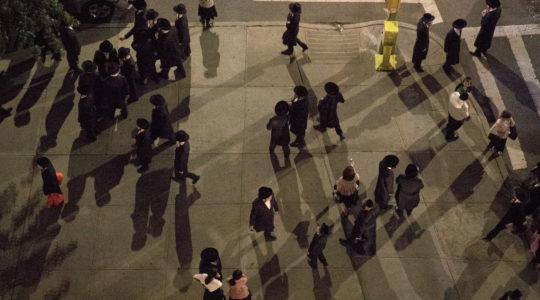For all of their deep and warm memories of the Egypt of their childhoods, neither André Aciman nor Lucette Lagnado, who discussed their new memoirs at a Jewish Week Literary Forum here last Tuesday evening, had any illusions about peace, democracy or positive feelings toward Jews resulting from the Tahrir Square revolution.
In a conversation with Jewish Week book critic Sandee Brawarsky, Aciman told a crowd of some 450 people at Congregation Rodeph Sholom, the evening’s co-sponsor, that Egypt’s Arab Spring “scares me.” He said he was “terribly distressed” at the prospect that the Muslim Brotherhood might come to power, and that despite calls for freedom, “I don’t think anything good will come of it.”
Lagnado agreed, and noted how the violent and public sexual assault on a CBS-TV female correspondent was “vastly under reported.”
She also described Egyptian anti-Semitism as “unchecked” now, noting that “at the risk of idealizing” relations between Arabs and Jews in the country in the 1930s and ‘40s, “it was a very tolerant society” at that time.
Aciman said that when he was a schoolboy in Alexandria in the 1950s, he had to memorize an anti-Semitic poem, and that negative feelings about Jews were always “under the surface — you could see and feel it.”
Most of the evening, though, was given over to the authors’ latest books — vividly remembered and poignant personal experiences about life before and after their families, and other Jews, were forced to leave Egypt in the early 1960s.
Aciman, a memoirist, essayist and novelist, read an excerpt from his new memoir, “Alibis,” describing the complexity of his personal identity. Though born in Egypt, he considers himself European, “an unreal Jew the way I am an imaginary European.”
He said he chose the title because alibi means “other place, homeless,” and he wanted to explore “what are you if you are unreal.”
Lagnado, whose book about her father, “The Man In The White Sharkskin Suit,” won the prestigious Sami Rohr Prize for Jewish Literature, chose her mother as the subject of her new memoir, “The Arrogant Years.” The book begins in the early ‘60s in Brooklyn, where the family “ended up” after leaving Egypt — reluctantly, on her father’s part.
As a 10-year-old, Loulou, the narrator based on the author herself, is obsessed with Mrs. Emma Peel, the fictional heroine of the popular television series at the time, “The Avengers.”
Lagnado described Loulou sitting in the women’s section of the synagogue and wanting to be on the other side, near her father.
“When people would ask me what I wanted to be when I grew up,” she recalled, “I would say, ‘an avenger.’”
Support the New York Jewish Week
Our nonprofit newsroom depends on readers like you. Make a donation now to support independent Jewish journalism in New York.
Both authors’ fathers were patriarchal and deeply reluctant to leave Egypt, sensing that their lives would spiral down in a new land, which is indeed what happened.
“When you lose your way of life, your identity is gone,” Aciman observed.
Said Lagnado: “The older ones died of broken hearts.”
The authors’ mothers were protective of their children. Lagnado said her mother, religiously devout, was afraid her children would become less observant in America, and that, too, is what came to be.
Both authors spoke of their deep need to connect to the places where they lived as children, before coming to America, and how they have sought to recapture the feel of those neighborhoods in their writing.
As a reporter, Lagnado said she “seeks out memories not her own,” including her older siblings’, “and I make them my own.”
Aciman said he “cultivates memory,” so that when he started writing of his experiences, the memories came back. “I didn’t have to try,” he said, they “were just there.”
Both authors expressed sadness, after returning to Egypt as adults, at how the society had changed. They said there was no one left with whom they could identify.
“It was terribly tragic,” Aciman said. “An entire civilization, gone.”
The New York Jewish Week brings you the stories behind the headlines, keeping you connected to Jewish life in New York. Help sustain the reporting you trust by donating today.




